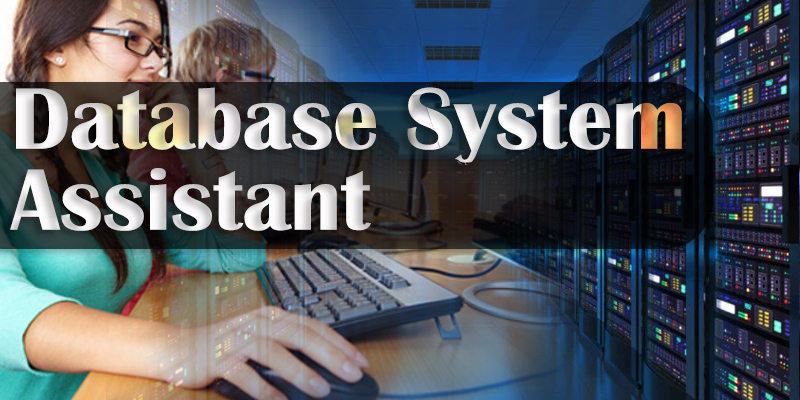
ITI Database System Assistant Trade Syllabus
The ITI "Database System Assistant" trade is a one-year vocational training program under the Craftsman Training Scheme (CTS), governed by the National Council for Vocational Training (NCVT). This course equips trainees with skills to install, configure, and manage database systems, create customized database files, and design online database applications using tools like Microsoft Access, MySQL, and open-source software. It also includes basic web development and network configuration skills. The syllabus integrates theoretical knowledge, practical database management skills, and employability training to prepare students for roles such as database assistants, system support staff, or junior database administrators in IT and industrial sectors.
Course Overview
- Duration: 1 year (2 semesters, each 6 months)
- NSQF Level: Level 4
- Eligibility: Minimum 12th grade pass with Science and Mathematics (or equivalent)
- Objective: To train individuals in managing database systems, securing data, and developing basic online database applications while ensuring employability in IT-related fields.
Detailed Syllabus Breakdown
1. Trade Theory (Theoretical Knowledge)
Covers foundational concepts in database systems and related technologies.
- Semester 1
- Introduction to Database Systems
- Concept of data, information, and databases.
- Overview of Database Management Systems (DBMS): types (RDBMS, OODBMS, NoSQL).
- Role and responsibilities of a Database System Assistant.
- Computer Fundamentals
- Basic components of a computer system: hardware and software.
- Operating Systems: Windows and Linux basics, installation, and configuration.
- File management and system utilities.
- Office Productivity Tools
- Microsoft Word: document creation, formatting, and editing.
- Microsoft Excel: worksheets, formulas, charts, data analysis basics.
- Microsoft PowerPoint: creating presentations.
- Database Concepts
- Introduction to Microsoft Access: database creation, tables, queries.
- Relational database concepts: primary keys, foreign keys, normalization.
- Basic SQL commands: SELECT, INSERT, UPDATE, DELETE.
- Networking Basics
- Introduction to computer networks: LAN, WAN, internet.
- Network configuration: IP addressing, browsing setup.
- Basics of network security: firewalls, user authentication.
- Introduction to Database Systems
- Semester 2
- Advanced Database Management
- MySQL: installation, configuration, and administration.
- SQL Server basics: integrating XML data with SQL databases.
- Database design principles: ER diagrams, relational schemas.
- Web Development for Databases
- HTML and PHP: designing web pages for database interaction.
- Basics of web servers: configuration and use (e.g., Apache).
- Introduction to open-source tools for online database systems.
- Database Security
- Security threats and vulnerabilities: data breaches, unauthorized access.
- Implementing security: user roles, permissions, encryption.
- Backup and recovery techniques: database backup, restoration.
- Reporting and Tools
- Reporting Services: generating reports from database data.
- Use of macros and Visual Basic for automation in Microsoft Access.
- Introduction to data analytics basics.
- Emerging Trends
- Overview of cloud databases and their applications.
- Introduction to Big Data and its relevance to database systems.
- Advanced Database Management
2. Trade Practical (Hands-On Skills)
Focuses on practical database management and system administration skills.
- Semester 1
- Computer Operations
- Assembling and disassembling basic computer hardware components.
- Installing Operating Systems (Windows/Linux) and application software.
- Practicing with Microsoft Office tools (Word, Excel, PowerPoint).
- Database Creation
- Creating and formatting tables in Microsoft Access.
- Designing simple queries and forms for data entry.
- Importing and exporting data between Excel and Access.
- Network Configuration
- Setting up a basic network connection (wired/wireless).
- Configuring internet browsing and testing connectivity.
- Basic troubleshooting of network issues.
- Computer Operations
- Semester 2
- Advanced Database Management
- Installing and configuring MySQL on a system.
- Executing SQL queries: creating, updating, and retrieving data.
- Designing a small database system with multiple tables.
- Web Development
- Creating static web pages using HTML.
- Developing dynamic web pages with PHP to connect to a database.
- Setting up a local web server and testing database connectivity.
- Security and Backup
- Creating user roles and assigning permissions in MySQL.
- Performing database backups and restoring data.
- Simulating security threats and applying countermeasures.
- Project Work
- Designing and developing an online database system (e.g., inventory or student records).
- Generating reports from the database using reporting tools.
- Advanced Database Management
3. Workshop Calculation and Science
Provides mathematical and scientific support for database-related tasks.
- Semester 1
- Basic arithmetic: calculations for data storage and memory sizes.
- Units of measurement: bits, bytes, KB, MB, GB, TB.
- Logic concepts: binary system, Boolean operations.
- Semester 2
- Algebra: basic equations for query optimization.
- Statistics: mean, median, mode for data analysis in Excel.
- Basics of data compression and encryption techniques.
4. Engineering Drawing
Focuses on technical drawing skills relevant to database systems.
- Semester 1: Drawing flowcharts for simple database processes.
- Semester 2: Creating Entity-Relationship (ER) diagrams for database design.
5. Employability Skills
Enhances job readiness and soft skills.
- Semester 1
- Communication skills: writing reports, interacting with team members.
- Time management: planning database tasks and deadlines.
- Basic IT skills: using office productivity software.
- Semester 2
- Entrepreneurship: opportunities in database support services.
- Resume writing and interview preparation.
- Advanced IT skills: introduction to database administration tools.
Assessment and Certification
- Examinations: Conducted semester-wise with theoretical and practical components.
- Certification: Successful candidates receive the National Trade Certificate (NTC) from NCVT, recognized nationally and internationally.
- Evaluation: Based on database creation, query execution, web development tasks, written exams, and project work.
Career Opportunities
- Employment: Database assistant, junior database administrator, IT support staff, data entry operator.
- Self-Employment: Freelance database management services, small-scale IT consultancy.
- Further Studies: Diploma in Computer Applications, advanced database courses (e.g., Oracle, SQL Server certification).
Note
- This syllabus aligns with the latest NCVT guidelines and may vary slightly based on institutional or state-specific requirements.
- For the most current version, refer to the Directorate General of Training (DGT) website (dgt.gov.in) or consult your local ITI.
Trade Type
- 7 views